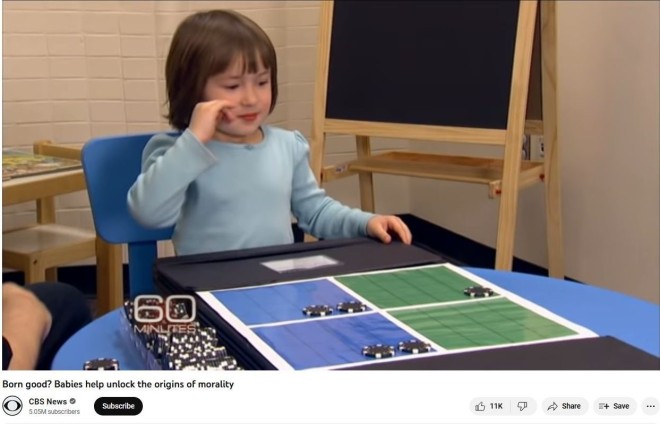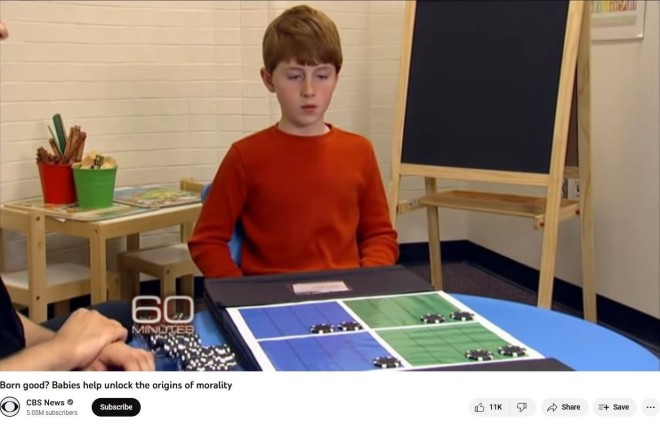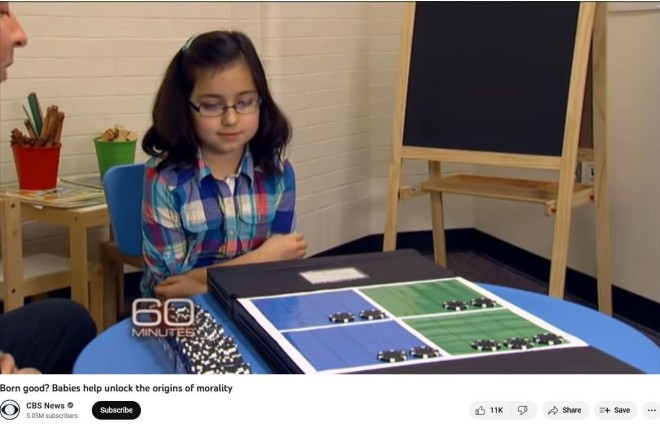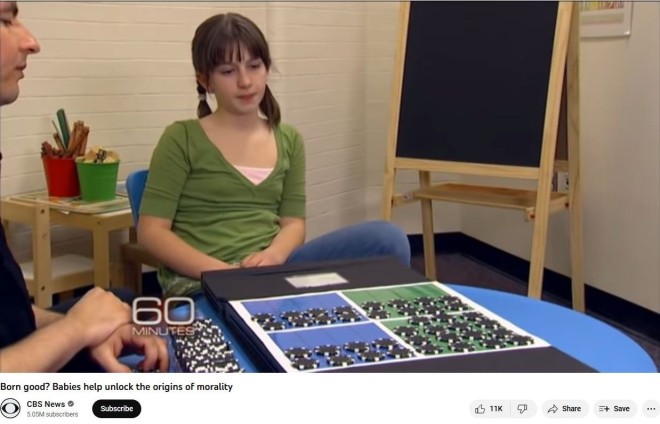Dr. Karen Wynn runs “the Baby Lab,” Yale University’s Infant Cognition Center. She collaborates with Paul Bloom, her husband, and also a former professor at Yale. In the accompanying video clips, five-month-old babies are shown puppet shows depicting various events. One involves just colored shapes, rather than puppets per se. One of the colored shapes is seen apparently struggling to get up a “slope.” In the picture below, it is the red circle.

In one scenario, another colored shaped, in this case, the yellow triangle, appears to help it get up the slope. In another, a third colored shape, a blue square, actively and seemingly maliciously stops the shape from achieving its goal. When the babies are given a choice between the colored shapes by someone who does not know which shape did what, and with the mothers’ eyes closed in order to prevent them from skewing the results, over 80% of the babies reach out to grab the “helper” figure, the yellow triangle, rather than the “antagonistic” blue square. With three-month-olds who are too young to reach like that, which they prefer is determined by which one they look at longer which comes out at 87% preference for the “nice” shape.
Another scenario has a rabbit puppet trying, but failing, to open the lid of a plastic transparent container. One puppet helps and, later, another one prevents the lid from opening by sitting on it. Again, babies prefer the helper, not the hinderer.
Later, when the hinderer is shown being stopped from opening a box, himself being hindered, the baby actually likes the puppet stopping the hinderer, indicating that the baby has a desire to see the miscreant be punished. They will select the punisher puppet when given a choice.

This is all very interesting. In Plato’s Gorgias or Republic we find Socrates arguing for this baby-friendly version of morality against cynics and actual psychopaths (judging from their comments and arguments). The character, Socrates, argues in favor of punishing those who do wrong, saying that it might promote reform, but, regardless, it is entirely just. Criminals getting their just deserts is in line with the Logos of the cosmos; the cosmic principle of order. In the Symposium, Eryximachus connects health with balance and harmony, achieved by satisfying desires that are in line with this.
Given the admirable moral discernment of babies, rewarding the good, punishing the bad, why is all not peace, love, and understanding? Well, when the babies are given a fairly arbitrary choice between Cheerios and Graham Crackers, they favor the toy that makes the same choice they do.
That is good as far as it goes. Positive and negative ethnocentrism is needed for a community to survive. One must be positively disposed to members of your group and be willing to fight against a hostile group, if necessary. What is interesting is how little it takes for someone to be considered a member of your group, at least for babies. An adult comparison could be which sports team one supports being enough to bond or alienate people.
The negative ethnocentrism of babies can be seen in the fact that not only do they prefer toys/agents/people that make the same choices they do, they actively want to see the toy that makes a different choice punished – just like they did with the toys that hindered rather than helped.
Babies take active pleasure in seeing something bad happen to a toy that makes a different choice from them and will reach for the toy that administers this bad thing. Schadenfreude is the German word English speakers have borrowed to refer to taking enjoyment from the suffering of others.

In another experiment, this time run by Paul Bloom, children get to decide how many tokens they will get versus how many tokens another child will get, who they are told will come in later. They are told that the tokens can be traded in for prizes.
So, for example, if a child says, “blue,” then she gets two tokens and the other girl will also get two tokens. If she says, “green,” then she only gets one token, and the other girl will get none. In that case, she will choose, “green.” In her mind, the preferred state of affairs is gaining an advantage over the other little girl. So long as she gets more, she is happy. And this is the case, even though she ends up with fewer tokens than she would have had if she had chosen, “blue,” which would have given both little girls two tokens each.
This is the same as a “joke” about a man who is asked how he will determine whether he has been successful in his career or not. He replies that he will consider himself successful so long as he earns more than his brother-in-law.
One wonders how the child would defend her actions if the other little kid, the one coming in later, confronted her about her decisions.
Bloom comments that the children do not want fairness, they want relatively more, in a game of social comparison. In some of the videos, the children can even be heard celebrating, saying, “Yay!” when they got lots of tokens and the other child got none.

But, around the age of eight, children start to choose the equal option. They do not seem particularly thrilled with their choice; they do not celebrate. They even look a little glum. But, they choose the equal amount nonetheless.
Around the ages of nine or ten, the children will even deliberately let the other child get more than them. This is not self-sacrificial altruism because there is no way to increase their own tally of tokens. Lesley Stahl describes this as the children becoming generous.
In fact, with adults, we see most people willing to give up money in order to punish someone they perceive as being particularly ungenerous. In the Ultimatum Game, one person is given $100, but they must give a portion to a second person if they want to keep the money. If the second person does not accept the offer, then no one gets anything. “Rationally” it is said that the second person should accept any amount, since it is free money. However, most people will reject the money if they feel that the first person is not being generous enough. Economists describe this as being “irrational” because, at least at one point, adopted the erroneous simplification that we are all rational egoists. We are neither particularly rational nor purely self-centered. As such, studying economics could make someone less able to predict or understand human behavior than the uninitiated. Socially and morally, it makes sense to punish stinginess and we are willing to do so at a cost to ourselves. Most people end up offering around 40% to the second person and this is accepted in most cases.


It is possible that children start to realize that there will be social consequences for being stingy. On the other hand, the second person is entirely hypothetical in that particular scenario, and, actually, there is in fact no other person who is going to turn up.
Bloom describes this change as the result of being educated and enculturated; with having their heads stuffed with the virtues that we might want their heads to be filled with.
It is not clear how Bloom knows this. No evidence is provided and so it counts as mere speculation. It seems possible that the older children are just more morally developed thanks to their greater cognitive capacities. We know for sure that the ability to take someone else’s perspective is age-dependent. There could also be an element of knowing that the attitude of “I want to be the girl with the most cake” might be hard to justify if questioned about it.
Bloom comments that the selfish bias is still there. When we are under pressure and life is difficult, we regress to our younger self. Lesley Stahl counters that, conversely, adversity can also bring out the best in us; namely, heroism and selfless sacrifice for strangers.
In an odd phenomenon not seen in these experiments, is out-group identification. Instead of identifying with someone like yourself, you feel connected to people unlike yourself, and will join up with them against your own in-group. There are people, for instance, who defend the most violent reprehensible criminals, while completely ignoring their victims as though they do not exist. Such people, not violent criminals themselves, see punishment such as prison as malicious, violent, and anti-human; a situation examined in Prisons and Punishment. Others are positively drawn to foreigners, seeing their existence as enriching and intrinsically interesting, in contrast to their fellow countrymen. Out-group identification is a sign of neuroticism, insecurity, and alienation. If you feel rejected by your in-group, you might as well join the out-group, and collaborate and scheme against those you feel ostracized you, or with whom one fears to compete in a straightforward fashion.
Disconcertingly, there is a strange phenomenon where organizations in the U.S. can call themselves any misleading thing they like, e.g., “The Supreme Authority on Transgendered Bees,” or “The National Institute of Butter Churning.” Along these lines is something called, “The Prison Law Office.” It sounds important, official, singular, and intimidatingly impersonal. “A Prison Law Office” would not have quite the same ring. Far from wanting to punish criminals, it wants to defend them and, preferably, keep them out of jail. The Innocence Project, defending the possibly wrongly convicted, is fine and worthy, and in keeping with morality that even babies understand. The Prison Law Office, not so much.
For the out-group sympathizers, one virtue signals by finding the most degenerate, awful kind of person to defend. It will help to have a high disgust tolerance. Ultimately, this behavior depends on a perverse variant of an anti-scapegoating impulse. The scapegoat victim is innocent of what he is accused of, but prisoners are guilty of a crime as best as we can determine. The new scapegoat victim is he who is seen as being insufficiently sympathetic to the oppressed. Yet, actual convicted criminals are not oppressed scapegoat victims – though we can join in shared hatred towards them, making them scapegoats as well as convicts. The worse the crime, and the less defensible a person’s actions, the more virtue is supposed to accrue to the defender. This can be called playing scapegoat poker. I’ll see your child rapist and raise you an entire grooming gang.
So, it is highly interesting that we have an in-built desire not only to gravitate towards those who like the same things we like, which is obvious, but to punish those who make a different choice. But, we are also well to remember that the neurotic, those who feel negative feelings strongly, might be motivated to betray their own in-group and to pass this off as virtuous. Since such people are not actually good and kind they will accomplish this only in words or by voting for policies, making sure the burden of helping the out-group will be shared by all and not by them in particular. They will also make sure not to be living in the neighborhoods to which violent criminals, rapists, murderers, anti-social looters and shoplifters, will be released. Looters and shoplifters, if tolerated, force businesses to close down or to hugely increase their prices to compensate and to pay for expensive insurance. The dearth of shops is then seen as a new inequity to be complained about.
https://www.youtube.com/watch?v=FRvVFW85IcU
Born good? Babies help unlock the origins of morality – CBS News
https://www.youtube.com/watch?v=HBW5vdhr_PA
Magazine – Can Babies Tell Right From Wrong? | The New York Times
Hamlin, J. Kiley; Karen Wynn; Paul Bloom (November 2007). “Social evaluation by preverbal infants”. Nature. 450 (7169): 557–559.

I linked to this at my own site. Fascinating stuff. The farther along I go, the more I am convinced that our behavior is run by genetics, trauma, and incentives, and not the usual environmental things we focus on and WERE certain about. We raised two sons at first, and having been in college in the 70s, were convinced that enriched environment was all. We each read to each boy 30 minutes a night, sang songs of many eras, taught prayers, were faithful at church including bringing them to meetings and events, stopped at every historical marker, monitored their emotional needs, choice of friends, and free play, we had no TV, seldom saw movies (so one son became a filmmaker, of course).
Eventually we spent many dollars sending them to Christian schools and core curriculum colleges. Then we adopted two from Romania and attempted the same, and eventually brought in a nephew late in the day for a total of five. I am now convinced that once they can make their own sandwiches, you can send them out to be raised by wolves, and not much is going to be different. They ae going to be what they are going to be, you might be able to work in some course correction. Maybe. There is good Swedish data showing that children who lost a parent early do not have different outcomes from those who did not. That is going to be “outcomes” in a broad sense, but still…
I tell young couples to have more children and worry about them less, because they are such a joy when grown.
Raised by wolves, I tell you. If you can find wolves who are willing.
I hope the Romanian orphans didn’t have attachment disorder. Given how different sibling often turn out with the same upbringing and so on, it stands to reason that the rest is mostly innate.
Our son had his own personality from the get go. I could see things that had nothing to do with us, his parents – usually good things, actually.
Music and musical performing is still a big part of his private life so all that violin and piano wasn’t a waste of time!
They came in 6th and 8th grade and did not have formal attachment disorder, though one had soft signs. They had been abused and neglected in their peasant village, but clearly, someone had picked them up in their first few years of life.